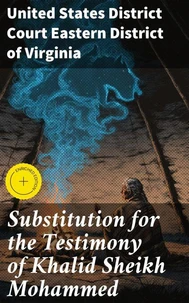Substitution for the Testimony of Khalid Sheikh Mohammed
Par :Formats :
Disponible dans votre compte client Decitre ou Furet du Nord dès validation de votre commande. Le format ePub est :
- Compatible avec une lecture sur My Vivlio (smartphone, tablette, ordinateur)
- Compatible avec une lecture sur liseuses Vivlio
- Pour les liseuses autres que Vivlio, vous devez utiliser le logiciel Adobe Digital Edition. Non compatible avec la lecture sur les liseuses Kindle, Remarkable et Sony
 , qui est-ce ?
, qui est-ce ?Notre partenaire de plateforme de lecture numérique où vous retrouverez l'ensemble de vos ebooks gratuitement
Pour en savoir plus sur nos ebooks, consultez notre aide en ligne ici
- Nombre de pages32
- FormatePub
- ISBN859-65--4708618-5
- EAN8596547086185
- Date de parution20/07/2022
- Protection num.Digital Watermarking
- Taille326 Ko
- Infos supplémentairesepub
- ÉditeurDIGICAT
Résumé
In "Substitution for the Testimony of Khalid Sheikh Mohammed, " the United States District Court for the Eastern District of Virginia delves into the complexities of legal testimony within the context of national security. This document grapples with vital issues surrounding military commission process, the nature of evidence, and the ramifications of controversial detainment practices. Written in a formal, judicial style, it articulates the court's procedural determinations while navigating intricate legal frameworks, a necessity given the charged political atmosphere marking the post-9/11 era.
The court's methodical approach serves both to clarify legal standards and to address public concern regarding transparency and justice in cases involving terrorism. The United States District Court for the Eastern District of Virginia, recognized for handling high-profile cases related to terrorism and national security, provides a pivotal lens through which Khalid Sheikh Mohammed's testimony is evaluated.
This court's unique position-operating at the intersection of civil liberty and security-reflects a landscape where legal debate intersects with moral and ethical dilemmas. The intense scrutiny surrounding Mohammed's case underscores the court's role in navigating the turbulent waters of contemporary justice. Readers interested in legal theory, human rights, or national security will find this document essential for understanding the challenges faced in adjudicating cases of such gravity.
It offers a valuable perspective on the balance between justice and security, a theme that remains ever-relevant in today's global environment.
The court's methodical approach serves both to clarify legal standards and to address public concern regarding transparency and justice in cases involving terrorism. The United States District Court for the Eastern District of Virginia, recognized for handling high-profile cases related to terrorism and national security, provides a pivotal lens through which Khalid Sheikh Mohammed's testimony is evaluated.
This court's unique position-operating at the intersection of civil liberty and security-reflects a landscape where legal debate intersects with moral and ethical dilemmas. The intense scrutiny surrounding Mohammed's case underscores the court's role in navigating the turbulent waters of contemporary justice. Readers interested in legal theory, human rights, or national security will find this document essential for understanding the challenges faced in adjudicating cases of such gravity.
It offers a valuable perspective on the balance between justice and security, a theme that remains ever-relevant in today's global environment.
In "Substitution for the Testimony of Khalid Sheikh Mohammed, " the United States District Court for the Eastern District of Virginia delves into the complexities of legal testimony within the context of national security. This document grapples with vital issues surrounding military commission process, the nature of evidence, and the ramifications of controversial detainment practices. Written in a formal, judicial style, it articulates the court's procedural determinations while navigating intricate legal frameworks, a necessity given the charged political atmosphere marking the post-9/11 era.
The court's methodical approach serves both to clarify legal standards and to address public concern regarding transparency and justice in cases involving terrorism. The United States District Court for the Eastern District of Virginia, recognized for handling high-profile cases related to terrorism and national security, provides a pivotal lens through which Khalid Sheikh Mohammed's testimony is evaluated.
This court's unique position-operating at the intersection of civil liberty and security-reflects a landscape where legal debate intersects with moral and ethical dilemmas. The intense scrutiny surrounding Mohammed's case underscores the court's role in navigating the turbulent waters of contemporary justice. Readers interested in legal theory, human rights, or national security will find this document essential for understanding the challenges faced in adjudicating cases of such gravity.
It offers a valuable perspective on the balance between justice and security, a theme that remains ever-relevant in today's global environment.
The court's methodical approach serves both to clarify legal standards and to address public concern regarding transparency and justice in cases involving terrorism. The United States District Court for the Eastern District of Virginia, recognized for handling high-profile cases related to terrorism and national security, provides a pivotal lens through which Khalid Sheikh Mohammed's testimony is evaluated.
This court's unique position-operating at the intersection of civil liberty and security-reflects a landscape where legal debate intersects with moral and ethical dilemmas. The intense scrutiny surrounding Mohammed's case underscores the court's role in navigating the turbulent waters of contemporary justice. Readers interested in legal theory, human rights, or national security will find this document essential for understanding the challenges faced in adjudicating cases of such gravity.
It offers a valuable perspective on the balance between justice and security, a theme that remains ever-relevant in today's global environment.


